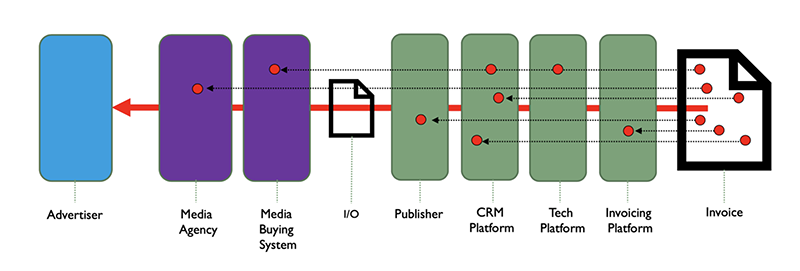
Media billing is like an Olympic relay race, the more adept you get at passing and receiving data the better chance you have of getting paid faster. Unfortunately, it’s a lot easier said, then done.
The digital media landscape changes so frequently the people, process and technology often can’t keep up. Over time, if your operating models don’t evolve with these changes your billing process could take longer, generate errors, require more resources, cause payment delays and negatively impact working capital for your company.
Below are some things you may want to consider to make your billing process more efficient. It would be a good idea to check with the leadership of your company to get a billing starting point so you can measure your improvements and know the changes made are making a difference.
Data Assessment
How clean is the data in your CRM? The role of the CRM is significant in the quote to cash billing process and maintaining it is essential to reducing payment delays.
Forbes Magazine, August 10th, 2019 “CRMs are chock-full of dirty data. According to research by Dun & Bradstreet, 91% of data in CRM systems is incomplete, 18% is duplicated, and 70% is rendered stale each year. The fallout of dirty data is devastating. 8 out of 10 companies believe that dirty data disrupts their sales pipelines and 25% experience reputational damage due to bad data.”
A few action items to take:
- Verify billing information in your CRM
- Gather the latest billing requirements from each of your clients?
- Where is this document stored and is it date stamped? Always track when the last time this information was updated and have a schedule to maintain it.
- Has your client’s billing requirements been verified against the billing information in your CRM?
- For your media agency clients, is the billing going through a central clearing house? (i.e. Publicis) If so, you must collect their billing requirements, the agency’s, incorporate both into your CRM
- (Pro Tip) Find out how agencies process revised invoices, for agencies that have billing clearing houses some have very specific ways they clear revised invoices
- Is there anything within your process that allows someone from your company or your client to override verified billing information?
- (Pro Tip) Media agency staff turnover is common in the media industry, if a buyer resigns from their agency find out before they leave who will be taking over their account. Make sure your CRM is updated to help resolve future discrepancies.
What Agencies Need to Clear Invoices
It’s important once you have gathered the agency’s billing requirements to incorporate them into your people, process and technology.
You must verify if there are ways to override any of these requirements and put checks and balances in place to mitigate against it. The more you configure your system to accurately incorporate agency billing requirements the more you reduce invoice discrepancies and rejections.
When Generating Monthly Invoices Make Sure You:
- Have the Insertion Order number on the invoice that is easily found by media buyer or clearinghouse.
- The flight dates on the I/O coincide with when the media actually ran. For example, if you issued an I/O in the last week of September and the media didn’t run until October get a new I/O from the agency media buyer.
- What makes an invoice discrepant? Check your billing document and make sure those billing requirements are built in your platform. Some common discrepancies are:
- Invoicing multiple campaigns that have multiple I/O’s on a single invoice
- Exceeding dollar discrepancy threshold required by the agency to clear an invoice
- Incorrect rates vs the I/O o
- Whose numbers are used for billing? Publishers? Third party?
- Know your T’s and C’s and how they impact billing? What are the viewability requirements? Brand safety etc?
- Media Ocean processes a lot of the invoices, pay attention to the notes section on the I/O because it may have additional billing requirements that may supersede the data in your CRM.
Improve Your Billing From the Back to the Front
A great way to look at how to reduce payment delays is to verify that you have captured the 10-15 critical data points an agency needs to clear an invoice. Then, map how that data is captured throughout the quote-to-cash lifecycle.
Below is a visual of how billing information travels. A great exercise is to map all of the systems used in your billing process and map it against the agency billing requirements you have gathered. It’s a detailed process but it quickly reveals the gaps and where you can modify your processes and technology to fix the root cause of a payment delay. Many times people aren’t aware that bad data is traveling throughout their systems in the first place which makes the delay persist.
These are a few things you can do to reduce payment delays, there are a lot more. I have developed a detailed playbook that shows the best ways to pass and receive media billing information from publisher to media agency and inform you how to incorporate that into your media billing operations.
If you have any questions about this article or for more information you can contact Allen Singer at [email protected].
